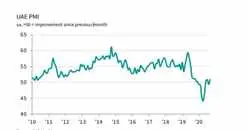PHOTO
The UAE's non-oil private sector economy saw a renewed improvement in September with its headline Purchasing Managers' Index (PMI) reading back in expansionary territory.
The IHS Markit UAE PMI posted its reading at 51 in September, the highest for 11 months, strengthened by a faster increase in output levels and an additional rise in new work.
“This marks another data point which signals that the recovery remains on-track, notwithstanding a recent resurgence of the virus," Ehsan Khoman, Head of MENA Research and Strategy at MUFG told Zawya.
However, the index remained well below its 54.1 average in 2019 and signalled only a slight uplift in overall business conditions. Readings above 50 signal an improvement in business conditions on the previous month, while readings below 50 show a deterioration.
“Granted, the headline PMI reading is still 3.1 points below the average level for 2019 as a whole, but an expansionary figure above 50 is a testament that corporates remain optimistic as they continue to learn to live and embrace the virus," Khoman noted.


UAE firms reported a further increase in output at the end of the third quarter, extending the run of growth to four months.
Rising activity levels were supported by a solid upturn in new business, as companies noted a further rebound in consumer demand after relaxed COVID-19 restrictions.
The breakdown suggests that new orders rose as corporates offered aggressive discounts, which was offset by lower employment in the private sector, despite higher output as firms continued to prioritise cost reductions.
There are concerns that the recent rise in the coronavirus cases could prompt a new set of lockdown restrictions in the future. According to David Owen, Economist at IHS Markit, given the weak nature of the current rebound, any further measures could lead to a "double-dip" in business activity.
Last week the UAE recorded its highest daily total of coronavirus infections with 1,158 new cases.
MUFG's Khoman, said: “Looking ahead, the UAE authorities are attempting to strike the delicate balance between limiting further damage to the economy with health risks and thus reopenings are being implemented through a phase-by-phase approach. Our base case assumes that we continue on a path of tentative and occasionally interrupted re-openings, rather than seeing further iterative waves of the pandemic that forces a return to draconian lockdowns."
"There is much about the pandemic that we can’t be sure of and iterative virus waves certainly cannot be ruled out, however, we certainly appear to be over the worst,” he added.
(Reporting by Seban Scaria; editing by Daniel Luiz)
Disclaimer: This article is provided for informational purposes only. The content does not provide tax, legal or investment advice or opinion regarding the suitability, value or profitability of any particular security, portfolio or investment strategy. Read our full disclaimer policy here.
© ZAWYA 2020





















